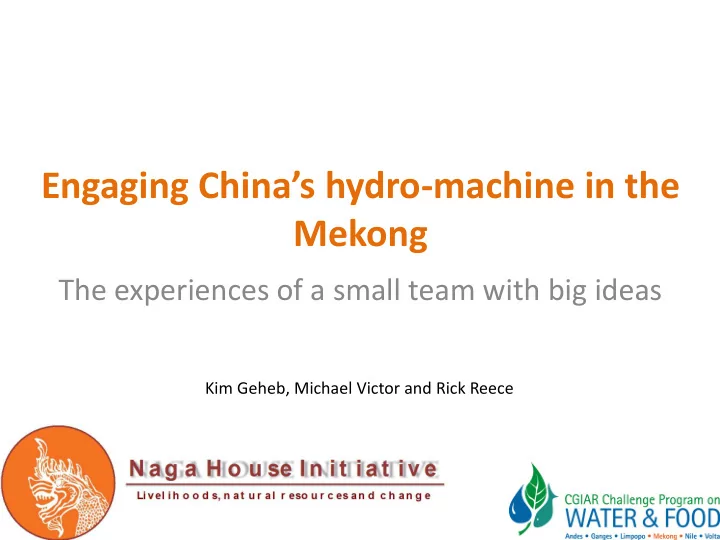

Engaging China’s hydro-machine in the Mekong The experiences of a small team with big ideas Kim Geheb, Michael Victor and Rick Reece
Chinese Influence in the Mekong Control Mekong headwaters. Responsible for half of all dam construction in the Lower Mekong. Globally dominant hydropower builders, operators and practitioners.
Hydropower development in the Mekong River Basin ≈ 158 dams. Country Commissioned Construction Planned Totals Cambodia 0 2 11 13 China 7 7 8 22 Laos 17 14 69 100 Myanmar 0 0 1 1 Thailand 8 0 0 8 Vietnam 14 0 0 14
What do the Chinese say? ‘We mitigate’ ‘We share data’ ‘We cooperate’ ‘We delay construction’
Downstream impact
China ‘goes out’ China Datang Corporation, China Datang Overseas Investment Co., Ltd. China Electrical Engineering Co., China Guodian, China International Electric and Water Corporation, China National Electronics Import and Export Corporation, China National Machinery & Equipment Import & Export Corporation, China Southern Power Grid, China Three Gorges Corporation, Chongqing Foreign Trade and Economic Cooperation (Group) Co., Ltd, Dongfang Electric Corporation, Gezhouba, Guangxi Guiguan Electric Power, Huadian, Huaneng Lancang River Hydropower, Hydro China Zhongnan Engineering Corporation, Sinohydro, Yunnan Provincial Power Investment 18 companies 39 dams
Why should this concern us? China voted against the UN Water Course Convention Engineering and durability concerns. Poor CRS, environmental and social safeguard strategies.
CGIAR Challenge Program on Water and Food
CPWF in the Mekong Focus: Making hydropower more sustainable – Optimization of reservoirs for agriculture, livelihoods and other ESS. Research-for-development. Partnership based Creating a platform for bringing together diverse actors
What are we doing about it? Engagement – the development of trust. Communications – the development of shared meaning. Improvement of standards – improved social/environmental safeguards and transparency. Projects – to constructively critique and seek common solutions.
Engagement Exchange visits and workshops. Ecosystem Study Commission for International Rivers HydroLancang Yunnan Provincial Energy Bureau China International Water and Electric Corporation Sinohydro China National Electronics Export-Import Corporation China EXIM Bank National Development and Reform Commission Chinese Academy for the Social Sciences Peking University Ministry of Commerce
Communications
Improving standards
Projects
In Summary….a long way to go • Chinese investment and hydropower are here to stay. • Challenges: Governance, transparency, communication. • New discourses emerging which need greater nuance. • Multiple engagement strategies are needed.
Thank you for your attention!!
Recommend
More recommend